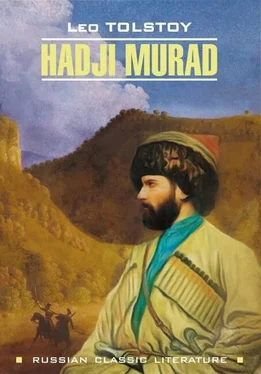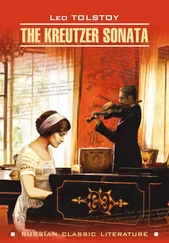“At the rescue, your Excellency.”
Having started on his favorite theme, the general recounted circumstantially how Hadji Murad had so cleverly cut the detachment in two that if the rescue party had not arrived (he seemed to be particularly fond of repeating the word “rescue”) not a man in the division would have escaped, because … He did not finish his story, for Manana Orbelyani, having understood what was happening, interrupted him by asking if he had found comfortable quarters in Tiflis. The general, surprised, glanced at everybody all round and saw his aides-de-camp from the end of the table looking fixedly and significantly at him, and he suddenly understood! Without replying to the princess’s question, he frowned, became silent, and began hurriedly swallowing the delicacy that lay on his plate, the appearance and taste of which both completely mystified him.
Everybody felt uncomfortable, but the awkwardness of the situation was relieved by the Georgian prince – a very stupid man but an extraordinarily refined and artful flatterer and courtier – who sat on the other side of Princess Vorontsova. Without seeming to have noticed anything he began to relate how Hadji Murad had carried off the widow of Akhmet Khan of Mekhtuli.
“He came into the village at night, seized what he wanted, and galloped off again with the whole party.”
“Why did he want that particular woman?” asked the princess.
“Oh, he was her husband’s enemy, and pursued him but could never once succeed in meeting him right up to the time of his death, so he revenged himself on the widow.”
The princess translated this into French for her old friend Countess Choiseuil, who sat next to the Georgian prince.
“Quelle horreur!” 18 18 Quelle horreur! – What a horror!
said the countess, closing her eyes and shaking her head.
“Oh no!” said Vorontsov, smiling. “I have been told that he treated his captive with chivalrous respect and afterwards released her.”
“Yes, for a ransom!”
“Well, of course. But all the same he acted honorably.”
These words of Vorontsov’s set the tone for the further conversation. The courtiers understood that the more importance was attributed to Hadji Murad the better the prince would be pleased.
“The man’s audacity is amazing. A remarkable man!”
“Why, in 1849 he dashed into Temir Khan Shura and plundered the shops in broad daylight.”
An Armenian sitting at the end of the table, who had been in Temir Khan Shura at the time, related the particulars of that exploit of Hadji Murad’s.
In fact, Hadji Murad was the sole topic of conversation during the whole dinner.
Everybody in succession praised his courage, his ability, and his magnanimity. Someone mentioned his having ordered twenty six prisoners to be killed, but that too was met by the usual rejoinder, “What’s to be done? A la guerre, comme al la guerre!”
“He is a great man.”
“Had he been born in Europe he might have been another Napoleon,” said the stupid Georgian prince with a gift of flattery.
He knew that every mention of Napoleon was pleasant to Vorontsov, who wore the White Cross at his neck as a reward for having defeated him.
“Well, not Napoleon perhaps, but a gallant cavalry general if you like,” said Vorontsov.
“If not Napoleon, then Murat.”
“And his name is Hadji Murad!”
“Hadji Murad has surrendered and now there’ll be an end to Shamil too,” someone remarked.
“They feel that now” (this “now” meant under Vorontsov) “they can’t hold out,” remarked another.
“Tout cela est grâce à vous!” 19 19 Tout cela est grâce à vous! – This is all thanks to you!
said Manana Orbelyani.
Prince Vorontsov tried to moderate the waves of flattery which began to flow over him. Still, it was pleasant, and in the best of spirits he led his lady back into the drawing room.
After dinner, when coffee was being served in the drawing room, the prince was particularly amiable to everybody, and going up to the general with the red bristly mustaches he tried to appear not to have noticed his blunder.
Having made a round of the visitors he sat down to the card table. He only played the old-fashioned game of ombre. His partners were the Georgian prince, an Armenia general (who had learned the game of ombre from Prince Vorontsov’s valet), and Doctor Andreevsky, a man remarkable for the great influence he exercised.
Placing beside him his gold snuff-box with a portrait of Aleksandr I on the lid, the prince tore open a pack of highly glazed cards and was going to spread them out, when his Italian valet brought him a letter on a silver tray.
“Another courier, your Excellency.”
Vorontsov laid down the cards, excused himself, opened the letter, and began to read.
The letter was from his son, who described Hadji Murad’s surrender and his own encounter with Meller-Zakomelsky.
The princess came up and inquired what their son had written.
“It’s all about the same matter… . Il a eu quelques desagrements avec le commandant de la place. Simon a eu tort… . But All’s well that ends well,’” he added in English, handing the letter to his wife; and turning to his respectfully waiting partners he asked them to draw cards.
When the first round had been dealt Vorontsov did what he was in the habit of doing when in a particularly pleasant mood: with his white, wrinkled old hand he took out a pinch of French snuff, carried it to his nose, and released it.
When Hadji Murad appeared at the prince’s palace next day, the waiting room was already full of people. Yesterday’s general with the bristly mustaches was there in full uniform with all his decorations, having come to take leave. There was the commander of a regiment who was in danger of being court martialled for misappropriating commisarriat money, and there was a rich Armenian (patronized by Doctor Andreevsky) who wanted to obtain from the Government a renewal of his monopoly for the sale of vodka. There, dressed in black, was the widow of an officer who had been killed in action. She had come to ask for a pension, or for free education for her children. There was a ruined Georgian prince in a magnificent Georgian costume who was trying to obtain for himself some confiscated Church property. There was an official with a large roll of paper containing a new plan for subjugating the Caucasus. There was also a Khan who had come solely to be able to tell his people at home that he had called on the prince.
They all waited their turn and were one by one shown into the prince’s cabinet and out again by the aide-de-camp, a handsome, fair-haired youth.
When Hadji Murad entered the waiting room with his brisk though limping step all eyes were turned towards him and he heard his name whispered from various parts of the room.
He was dressed in a long white Circassian coat over a brown beshmet trimmed round the collar with fine silver lace. He wore black leggings and soft shoes of the same color which were stretched over his instep as tight as gloves. On his head he wore a high cap draped turban-fashion – that same turban for which, on the denunciation of Akhmet Khan, he had been arrested by General Klugenau and which had been the cause of his going over to Shamil.
He stepped briskly across the parquet floor of the waiting room, his whole slender figure swaying slightly in consequence of his lameness in one leg which was shorter than the other. His eyes, set far apart, looked calmly before him and seemed to see no one.
The handsome aide-de-camp, having greeted him, asked him to take a seat while he went to announce him to the prince, but Hadji Murad declined to sit down and, putting his hand on his dagger, stood with one foot advanced, looking round contemptuously at all those present.
Читать дальше
Конец ознакомительного отрывка
Купить книгу












